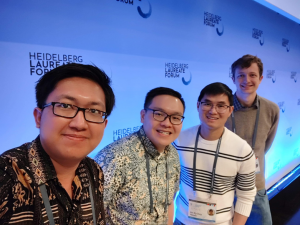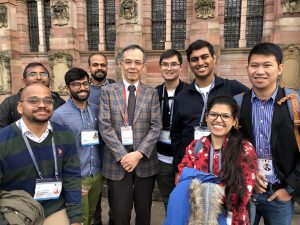An Ky Duy Nguyen
La Trobe University
Where are you in your career?
I graduated from La Trobe University in 2022 with a Master of Science degree in pure mathematics. I intend to begin my PhD study next year, also in pure mathematics.
Why do you want to attend the HLF?
The Forum is a perfect opportunity for me to meet and interact with top specialists in mathematics and computer science. Being able to hear and ask questions about their scientific journeys and experiences will give me a lot of insights into how an influential mathematician thinks and approaches a problem. At the same time, the Forum is also a valuable networking event for me, where I can meet with other young researchers and stay updated with recent developments in the community.
Tell us about your research.
The research undertaken in my project lies in the overlap of three areas-Lie theory, Riemannian geometry and dynamic systems. We first adopted a result by John Milnor and used it as a starting point to classify 3 and 4-dimensional metric Lie groups. Then, together with the Euler-Arnold equation, we found all homogeneous geodesics on these groups and classified their Lyapunov stability.
If you could meet any Fields Medalist or Abel Prize winner which, would it be and why?
I would love to meet John Milnor, as his theories and results are directly related to my Master’s project. I also want to talk to James Maynard, as I am especially interested in number theory prime numbers.
9th Heidelberg Laureate Forum Report
After two digital events, the 9th Heidelberg Laureate Forum (HLF) was held in person this year at the Neue Universität, located at the heart of Heidelberg city in Germany, from 18 to 28 September 2022. Around 200 young researchers from around the world were given the unique opportunity to meet and interact with the most influential mathematicians and computer scientists and learn how the laureates made it to the top of their fields. Supported by La Trobe University, AMSI/AustMS, and the Abbe Grant, I came to the Forum on 17 September, completed the mandatory Covid-19 antigen test (which, by the way, was required daily for all participants), and felt absolutely eager to listen to the laureates’ scientific journeys and ask for their advice and experiences. We began the program each day with an introductory lecture, followed by an extensive, sometimes heated, panel discussion between laureates. The topics explored this year were very broad and multidisciplinary, ranging from future challenges in mathematics and CS, science communication with the public to deep learning and its potential impacts on society. I was particularly impressed with the “Imitation games” lecture given by 2021 Abel Prize winner Avi Wigderson, where he adopted the famous Turing test to explore many different concepts, from theoretical ideas such as patterns in prime numbers and randomness to practical aspects like cryptography and modern-day privacy. In my opinion, this talk perfectly highlighted one of the main themes of HLF this year: raising awareness of the long-term implications of theoretical mathematics and computer science for society at large.
There were plenty of social activities for young researchers to network and talk with laureates in between these scientific programs. For example, during the coffee breaks after each discussion, I could freely approach any laureate to introduce myself and exchange conversations. All of them were so friendly, humble and open about their experiences, and their storytelling was so engaging and attractive that there was usually a gathering of students around every laureate shortly afterwards. Lunches and dinners were also set up so that young researchers could choose a particular laureate’s table and engage directly with them while enjoying many flavourful buffet dishes. Furthermore, the session “Career paths for mathematicians and computer scientists” was specifically designed so that young researchers could ask personal questions and collect practical guidance from experts and alumni on how to better prepare for their future in both academia and business.
At the same time, young researchers could easily talk to each other, make new friends and exchange information using the name tags and business cards prepared in advance by the Forum. There were also other extracurricular activities to enhance and broaden the socializing among participants, such as visits to local schools and institutions, boat trips on the Neckar river, or the Heidelberg Castle tour. I eventually started to remember many young researchers, yet it seemed like I always met new faces every day until the last minute. I firmly believe that the lessons I learnt from the laureates and the connections I made with other young researchers would be invaluable and have a positive, long-lasting influence on my future career.
Figure 1: 2022 HLF Australian attendees (left to right): Albert Christian Soewongsono, Yudhistira Andersen Bunjamin, An Ky Duy Nguyen, James Stanfield.
Figure 2: Photo with 1990 Fields Medallist Shigefumi Mori and other young researchers at Heidelberg Castle



